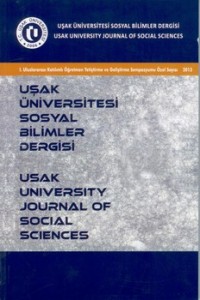Identifying and Comparing The Attitudes of 1st, 2nd, 3rd and 4th Grade ELT Students Towards Drama Activities
Abstract
Yaşadığımız çağ bir iletişim çağıdır diyebiliriz. Bu çağda insanların dil öğrenmesi son derece büyük bir önem arz etmektedir. Dil öğretiminde de en önemli eğilimlerin başını iletişimci yaklaşım (communicative approach) çekmektedir. Bu yaklaşıma göre dil öğrenen kişilerin sınıfta gerçek yaşamdakine benzer durumlar içinde dili ‘kullanarak’ öğrenmeleri öngörülmektedir. Bu tip deneyimleri sağlaması açısından drama etkinlikleri dil öğretimi alanında özel bir yere ve öneme sahiptir. Bu bakımdan İngilizce öğretecek öğretmenlerin bir yöntem olarak dramayı bilmeleri ve dramaya karşı olumlu bir tutum sergilemeleri önem taşımaktadır. Yaratıcı drama etkinlikleri Muğla Üniversitesinde dört yıl boyunca her seviyedeki sınıflarda bazı derslerde kullanılmaktadır. Bu araştırmanın amacı öğrencilerin drama etkinliklerine karşı tutumlarının bu dört yıl içinde değişip değişmediğini, eğer değişiyorsa ne yönde değiştiğini anlamaktır Muğla Üniversitesi İngilizce öğretmenliği bölümünde halen kayıtlı bulunan 216 öğrenciden 125’ine ulaşılmıştır. Araştırmacının kendisi tarafından geliştirilen bir tutum ölçeği kullanılarak öğretmen adaylarının bir yöntem olarak dramaya karşı tutumları araştırılmıştır. Birinci sınıftan dördüncü sınıfa kadar olan öğrencilerin tutum puanları karşılaştırılarak tartışılmıştır. Bulgulara göre tüm sınıflar için tutumlar olumlu yönde çıkmış olmakla birlikte programda drama dersinin yer aldığı üçüncü sınıftaki öğrencilerin tutumlarının anlamlı derecede daha yüksek olduğu gözlenmiştir. Bu araştırmanın sonuçları ışığında drama dersinin programdaki yeri ve süresi değerlendirilebilir. Ayrıca, dördüncü sınıf öğrencilerinin tutumlarının üçüncü sınıf öğrencilerinin tutumlarına göre daha düşük olması ileriki bir araştırmada incelenebilir.
Keywords
References
- Adıgüzel, Ö. (2010). EğitimdeYaratıcı Drama. Naturel Yayıncılık: Ankara.
- Bertiz, H.; Bahar, M. & Yeğen, G. (2010). TheAttitudes of ProspectiveScienceandTechnologyTeachersTowards Creative Drama MethodandTheirViews on Using theMethod in ScienceandTechnologyEducation. Gazi Eğitim Fakültesi Dergisi. 30(2). Pp. 483-509.
- Bozdoğan, Ö. (2003). Drama as a Compulsory Course in EducationFaculties. M.A. Thesis. Gazi University: Ankara.
- Hamurcu, H. (2009). Sınıf Öğretmenliği Bölümü Öğrencilerinin Yaratıcı Dramaya Yönelik Tutumları. E-Journalof New World Sciences Academy. 4(4). RetrievedMarch, 10, 2011 fromwww.newwsa.com. Kavcar, C. (2006). Örgün Eğitimde Dramatizasyon. In H. Ö. Adıgüzel (Ed.). Yaratıcı Drama 1985-1998 Yazılar. Naturel Yayınları: Ankara. Pp. 18
- Maley, A. &Duff, A. (1982). Drama techniques in languagelearning: A resourcebook of communicationactivitiesforlanguageteachers. Cambridge UniversityPress: Cambridge.
- Özdemir, S. M. & Çakmak, A. (2008). TheEffect of Drama Education on ProspectiveTeachers’ Creativity. International Journal of Instruction. 1(1). Pp.13-30.
- San, İ. (2006). Eğitimde Yaratıcı Drama. In H. Ö. Adıgüzel (Ed.). Yaratıcı Drama 1985-1998 Yazılar. Naturel Yayınları: Ankara. Pp. 46-57.
- San, İ. (2006). Yaratıcı Dramanın Eğitsel Boyutları. In H. Ö. Adıgüzel (Ed.). Yaratıcı Drama 1985-1998 Yazılar. Naturel Yayınları: Ankara. Pp.113-122.
- Wallace, M.J.(1991). Training Foreign Language Teachers: A reflectiveapproach. Cambridge UniversityPress:Cambridge.
İngilizce Öğretmenliği 1., 2., 3. ve 4. Sınıf Öğrencilerinin Drama Aktivitelerine Yönelik Tutumlarının Belirlenmesi ve Karşılaştırılması
Abstract
A large portion of the success in language learning depends on the specific classroom methodology chosen by the teacher. The most emphasized methods in the field of ELT are those which put the student in the centre and emphasize the real life like situations whereby students can use the language communicatively. Creative Drama has the potential of providing such opportunities. Students learn the language through game like procedures, by role-playing and simulating the real life. Creative drama activities are used in lessons at all levels in certain lessons in ELT department of Muğla University. The aim of this study is to find out in what ways the attitudes of ELT department students’ attitudes towards drama as a method of instruction change throughout the four academic years. 125 of 216 students currently active in Muğla University ELT department have been reached and a questionnaire was applied to them. The dependent variable is the results from an attitude scale developed by the researcher while the independent variables are students’ grade-levels and whether they have taken the drama lesson in the 3rd year or not. The results were analyzed descriptively. It was found that the attitudes of students towards drama are somewhat positive at all levels. This study showed that the students who had taken and passed drama have more positive attitudes than those who didn’t. Junior students had the most positive attitudes and their attitudes were significantly different from those of the freshmen. The underlying reasons must be investigated by further study. Another questionnaire for the senior students can be developed or a series of semi-structured interviews can be held.
References
- Adıgüzel, Ö. (2010). EğitimdeYaratıcı Drama. Naturel Yayıncılık: Ankara.
- Bertiz, H.; Bahar, M. & Yeğen, G. (2010). TheAttitudes of ProspectiveScienceandTechnologyTeachersTowards Creative Drama MethodandTheirViews on Using theMethod in ScienceandTechnologyEducation. Gazi Eğitim Fakültesi Dergisi. 30(2). Pp. 483-509.
- Bozdoğan, Ö. (2003). Drama as a Compulsory Course in EducationFaculties. M.A. Thesis. Gazi University: Ankara.
- Hamurcu, H. (2009). Sınıf Öğretmenliği Bölümü Öğrencilerinin Yaratıcı Dramaya Yönelik Tutumları. E-Journalof New World Sciences Academy. 4(4). RetrievedMarch, 10, 2011 fromwww.newwsa.com. Kavcar, C. (2006). Örgün Eğitimde Dramatizasyon. In H. Ö. Adıgüzel (Ed.). Yaratıcı Drama 1985-1998 Yazılar. Naturel Yayınları: Ankara. Pp. 18
- Maley, A. &Duff, A. (1982). Drama techniques in languagelearning: A resourcebook of communicationactivitiesforlanguageteachers. Cambridge UniversityPress: Cambridge.
- Özdemir, S. M. & Çakmak, A. (2008). TheEffect of Drama Education on ProspectiveTeachers’ Creativity. International Journal of Instruction. 1(1). Pp.13-30.
- San, İ. (2006). Eğitimde Yaratıcı Drama. In H. Ö. Adıgüzel (Ed.). Yaratıcı Drama 1985-1998 Yazılar. Naturel Yayınları: Ankara. Pp. 46-57.
- San, İ. (2006). Yaratıcı Dramanın Eğitsel Boyutları. In H. Ö. Adıgüzel (Ed.). Yaratıcı Drama 1985-1998 Yazılar. Naturel Yayınları: Ankara. Pp.113-122.
- Wallace, M.J.(1991). Training Foreign Language Teachers: A reflectiveapproach. Cambridge UniversityPress:Cambridge.
Details
| Primary Language | English |
|---|---|
| Journal Section | Articles |
| Authors | |
| Publication Date | June 1, 2013 |
| Published in Issue | Year 2013 Volume: 6 Issue: -ÖYGE Özel Sayısı |
Address: Uşak University Graduate Education Institute
Telephone: 0276 221 21 60 Fax: 0276 221 21 61
E-mail: sosyaldergi@usak.edu.tr


